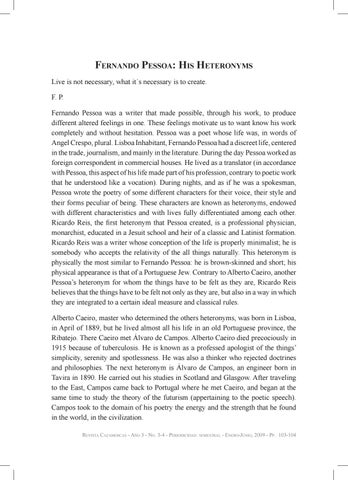Fernando Pessoa: His Heteronyms Live is not necessary, what it´s necessary is to create. F. P. Fernando Pessoa was a writer that made possible, through his work, to produce different altered feelings in one. These feelings motivate us to want know his work completely and without hesitation. Pessoa was a poet whose life was, in words of Angel Crespo, plural. Lisboa Inhabitant, Fernando Pessoa had a discreet life, centered in the trade, journalism, and mainly in the literature. During the day Pessoa worked as foreign correspondent in commercial houses. He lived as a translator (in accordance with Pessoa, this aspect of his life made part of his profession, contrary to poetic work that he understood like a vocation). During nights, and as if he was a spokesman, Pessoa wrote the poetry of some different characters for their voice, their style and their forms peculiar of being. These characters are known as heteronyms, endowed with different characteristics and with lives fully differentiated among each other. Ricardo Reis, the first heteronym that Pessoa created, is a professional physician, monarchist, educated in a Jesuit school and heir of a classic and Latinist formation. Ricardo Reis was a writer whose conception of the life is properly minimalist; he is somebody who accepts the relativity of the all things naturally. This heteronym is physically the most similar to Fernando Pessoa: he is brown-skinned and short; his physical appearance is that of a Portuguese Jew. Contrary to Alberto Caeiro, another Pessoa’s heteronym for whom the things have to be felt as they are, Ricardo Reis believes that the things have to be felt not only as they are, but also in a way in which they are integrated to a certain ideal measure and classical rules. Alberto Caeiro, master who determined the others heteronyms, was born in Lisboa, in April of 1889, but he lived almost all his life in an old Portuguese province, the Ribatejo. There Caeiro met Álvaro de Campos. Alberto Caeiro died precociously in 1915 because of tuberculosis. He is known as a professed apologist of the things’ simplicity, serenity and spotlessness. He was also a thinker who rejected doctrines and philosophies. The next heteronym is Álvaro de Campos, an engineer born in Tavira in 1890. He carried out his studies in Scotland and Glasgow. After traveling to the East, Campos came back to Portugal where he met Caeiro, and began at the same time to study the theory of the futurism (appertaining to the poetic speech). Campos took to the domain of his poetry the energy and the strength that he found in the world, in the civilization. Revista Cazamoscas - Año 3 - No. 3-4 - Periodicidad: semestral - Enero-Junio, 2009 - Pp. 103-104
Revista Cazamoscas Año 3 - No. 3 - 4 |Febrero - Junio 2009

Turn static files into dynamic content formats.
Create a flipbookArticles inside
Issuu converts static files into: digital portfolios, online yearbooks, online catalogs, digital photo albums and more. Sign up and create your flipbook.



